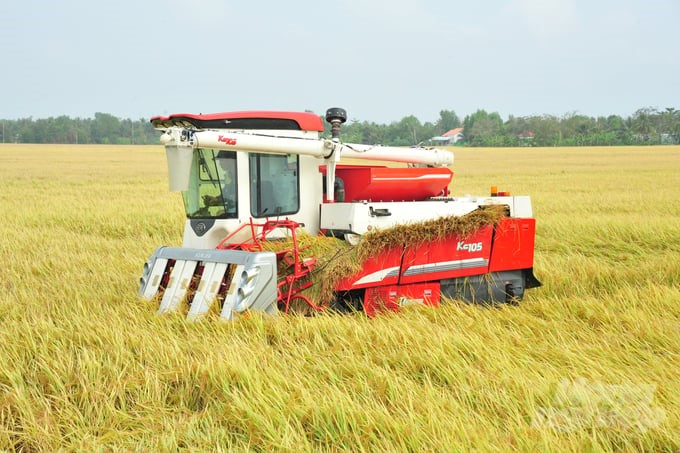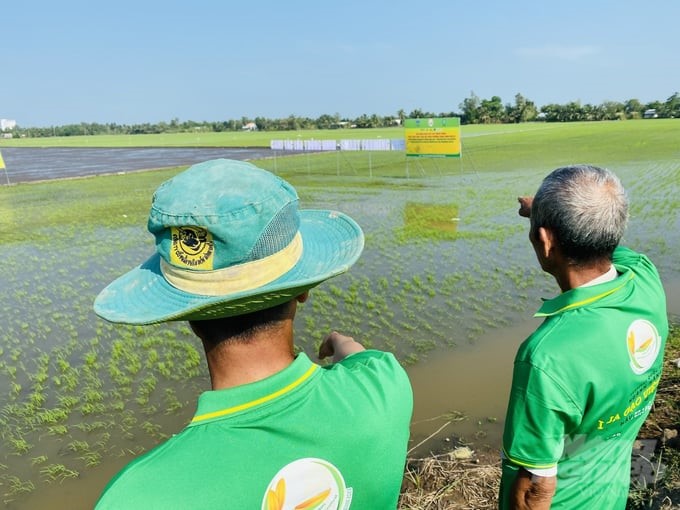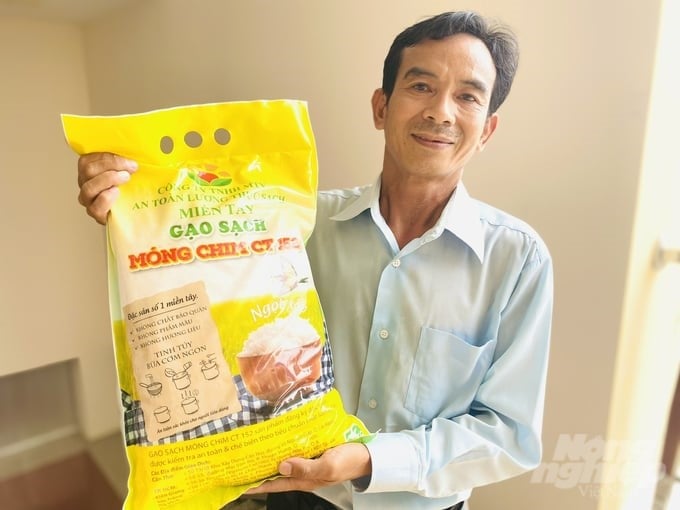June 14, 2025 | 22:10 GMT +7
June 14, 2025 | 22:10 GMT +7
Hotline: 0913.378.918
June 14, 2025 | 22:10 GMT +7
Hotline: 0913.378.918

Implementing the 1 million hectares of high-quality rice project, farmers will be able to improve their knowledge and skills in production, management, and marketing; reduce production costs; stabilize consumption; and increase income. Photo: Le Hoang Vu.
Recently, the Can Tho Union of Science and Technology Associations, in collaboration with the Can Tho Department of Agriculture and Rural Development and the Vietnam Farms and Agricultural Enterprises Association (VFAEA)—Mekong Delta Representative Office, has organized a scientific conference on "Solutions and opportunities to reduce greenhouse gas emissions from the 1 million hectares of high-quality rice project in the Mekong Delta."
The 1 million hectares of high-quality rice project aims to reorganize the production system along the value chain, applying sustainable farming processes. Thereby increasing value, sustainably developing the rice industry, improving production and business efficiency, income, and life of rice growers, protecting the environment, adapting to climate change, and reducing greenhouse gas emissions.
Activities will be carried out to implement the project, such as: researching greenhouse gas emissions in agricultural cultivation; methods for measuring greenhouse gas emissions; greenhouse gas emission-reducing farming; greenhouse gas emission monitoring methods; and technical solutions in implementing the project. In particular, attention is paid to a transparent greenhouse gas emission measurement system that meets the scientific basis for carbon credits...
According to Assoc. Prof. Dr. Nguyen Van Cong (Faculty of Environment and Natural Resources, Can Tho University), when participating in the 1 million hectares of high-quality rice project, farmer households will be able to improve their knowledge and skills in production, management, and marketing; reduce production costs; stabilize consumption; increase income (from rice, straw, etc.); and reduce health risks. Cooperatives will be able to improve capacity and roles and expand operations.

Alternate wetting and drying irrigation is an important technical solution in emission-reducing rice farming. Photo: VAN.
For businesses, they can access new technology, stabilize raw material areas, build brands, improve competitiveness, expand markets, and access credit along the chain.
From a state and community perspective, the project brings sustainable development of rice production and enhances value. Thereby contributing to implementing Vietnam's commitment to reducing greenhouse gas emissions; building a mechanism to manage and operate the carbon market from agricultural production; and perfecting mechanisms and policies to develop other production areas.
Mr. Nguyen Ngoc He, Vice Chairman of the Can Tho City People's Committee, said: Can Tho city has a total natural land area of about 141,000 hectares, of which nearly 80% is agricultural land. The annual rice farming area is over 75,000 hectares, and the annual rice output reaches over 1.3 million tons. According to the planning to 2030, with a vision to 2050, Can Tho city will form concentrated, specialized rice production areas with an area of 48,000 hectares, concentrated in 3 districts: Thoi Lai, Co Do, and Vinh Thanh.
Can Tho city is very honored to be selected and supported by the Ministry of Agriculture and Rural Development and the International Rice Research Institute to build a sustainable, high-quality rice farming model that meets the criteria of the 1 million hectares of high-quality, low-emission rice cultivation project. This is a pilot model for Can Tho city and other Mekong Delta provinces to jointly exchange, share, learn from experiences, and find effective solutions in the process of implementing the project in the coming time.

Can Tho City was selected and supported by the Ministry of Agriculture and Rural Development and the International Rice Research Institute to build a pilot model of sustainable, high-quality rice cultivation that meets the criteria of the 1 million hectares of high-quality rice project. Photo: Le Hoang Vu.
The 1 million hectares of high-quality rice project set the goal of applying sustainable farming processes to add value, sustainably develop the rice industry, protect the environment, adapt to climate change, and reduce greenhouse gas emissions, thereby contributing to implementing Vietnam's international commitments.
According to the specific goals of the project, by 2030, the cultivated area of high-quality and low-emission rice areas will reach 1 million hectares; the amount of seeds will reduce; the amount of chemical fertilizers and pesticides will decrease by 30%; and irrigation water will reduce by 20%. Post-harvest loss rate is below 8%; 100% of straw is collected from the field and processed for reuse (completely stopping the burning of straw that causes pollution); and greenhouse gas emissions reduce by over 10% compared to traditional rice farming. The project is implemented in 12 provinces and cities in the Mekong Delta (except Ben Tre).
Translated by Thu Huyen
![Turning wind and rain into action: [4] Bringing climate bulletins to remote and isolated areas](https://t.ex-cdn.com/nongnghiepmoitruong.vn/608w/files/linhnhp/2025/06/14/1152-z6704423696987_15fd32ffc26d590d204d520c9dac6786-nongnghiep-151141.jpg)
(VAN) The Vietnam Agriculture and Nature Newspaper interviewed Mr. Vu Thai Truong, Acting Head of Climate Change and Environment at UNDP Vietnam, to gain deeper insight into how climate bulletins are delivered to farmers.

(VAN) In Tien Giang, a high-tech shrimp farm has developed a distinctive energy-saving farming model that has yielded promising results.
![Turning wind and rain into action: [3] 300.000 farmers benefit from agro-climatic bulletins](https://t.ex-cdn.com/nongnghiepmoitruong.vn/608w/files/news/2025/06/12/e5a48259d6a262fc3bb3-nongnghiep-125122.jpg)
(VAN) The agro-climatic bulletin has become a valuable tool for farmers in the Mekong Delta. After more than five years of implementation, the initiative is gradually being expanded nationwide.
![Turning wind and rain into action: [2] Providing forecasts to the people](https://t.ex-cdn.com/nongnghiepmoitruong.vn/608w/files/news/2025/06/12/e5a48259d6a262fc3bb3-nongnghiep-103927.jpg)
(VAN) In addition to improving the quality of hydrometeorological forecasts, putting forecast bulletins into practical use is crucial for production and disaster prevention.

(VAN) Blue carbon is receiving attention for its rapid absorption capacity and vast potential. It represents a promising nature-based solution to respond to climate change.
/2025/06/11/3507-1-161904_583.jpg)
(VAN) Seagrass beds and coral reefs serve as 'cradles' that nurture life in the ocean depths, creating rich aquatic resources in Vietnamese waters.
![Turning wind and rain into action: [1] Forecasting for farmers](https://t.ex-cdn.com/nongnghiepmoitruong.vn/608w/files/news/2025/06/11/e5a48259d6a262fc3bb3-nongnghiep-111919.jpg)
(VAN) Weather is no longer just a matter of fate. Forecasts have now become an essential companion for farmers in every crop season.